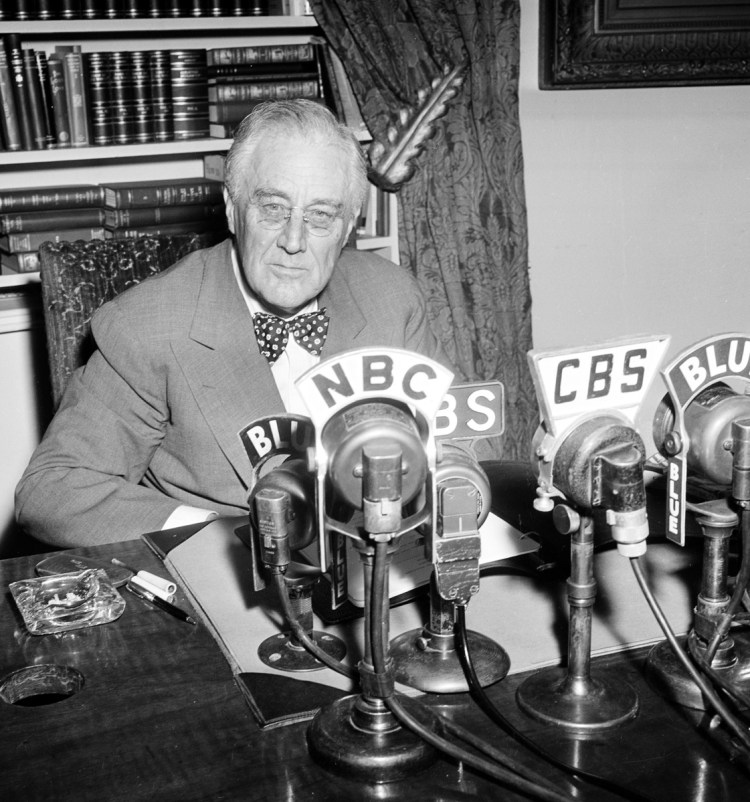BUXTON — Ever since Alexander Hamilton founded the Federalist Party in 1792, our country’s government has been plagued by division. These days, the split is between the Democrats, who pride themselves on a platform of “progressivism,” and the Republicans, who say “fiscal responsibility” will be our saving grace. Our country has switched between red and blue in an attempt to solve some of our most harrowing issues: endless war, a $20 trillion debt, poverty, institutionalized racism, climate change, etc.
Sometimes, we’ve ended up with a Democratic president and a Republican Congress, as was the case with Barack Obama. Other times, it’s been the opposite, like with George W. Bush. If you’ve ever talked to your “liberal” aunt or your fiercely “conservative” grandfather, you’ll find they seem to disagree on many issues. Is division really the root of the problem here? How much do the ideologies of these two parties differ?
Under Franklin Delano Roosevelt, a Democrat consistently ranked among our best presidents, the size and power of the federal government increased exponentially. Of course, it’s common knowledge that Roosevelt “saved” us from the Great Depression. Even former Speaker Newt Gingrich, R-Ga., has said that Roosevelt “did bring us out of the Depression” and is “the greatest figure of the 20th century.”
Social Security, government involvement in economic policy and a larger federal government became the norm under FDR. Conservatives in Congress didn’t let qualms about the size of the government or the raising of taxes keep them from supporting his New Deal initiatives. Adjusted for inflation, the minimum tax rate for someone making $4,887 a year (about $50,000 in today’s dollars) skyrocketed from 4 percent in 1940 to 26 percent in 1949, according to the Tax Foundation.
Roosevelt set the precedent for programs like Medicare and Medicaid that now take up the majority of the federal budget; giant agencies like the National Security Agency and the CIA; and federal departments that performed duties never detailed in the Constitution. Infuriated conservative small-government hawks were to find a hero in former actor and governor of California, Ronald Reagan. He expanded tax deductions and exemptions and expanded the “war on drugs” launched by President Richard Nixon, among other things.
Reagan also turns up on lists of best presidents, and Republicans generally look back on his legacy with favor, but when one looks at the facts, these victories aren’t quite as deserving of celebration. Reagan ended up increasing the total national debt by 188 percent while complicating the tax system and doing little to help the average American. As a share of GDP, nondefense discretionary spending decreased by a mere 1 percent during Reagan’s years in office. A Nixon aide later admitted, in a 1994 interview published in Harper’s Magazine 22 years later, that the war on drugs wasn’t meant to decrease usage of drugs but was instead meant to target “the anti-war left and black people.”
To throw some napalm on the fire, Reagan granted amnesty to 3 million illegal immigrants – an action that would make Republicans in today’s Congress faint.
On the other side of the aisle, Democratic lawmakers created and upheld racist policies into the 1960s, when Democrats in the South broke with the party over civil rights and the national party began to cater to black voters and support something that had been largely ignored since 1776: basic civil liberties. However, constitutional promises from Democrats have remained largely unfulfilled. In 2018, Americans are still extremely worried about racial divisions, women’s access to health care and the rights of LGBTQ people to jobs and housing.
Is the lack of progress entirely the fault of Democrats? Of course not. But the progress that has been made can be credited to independent groups that won hard-fought court battles, not to the Democratic Party, which spent the last few decades failing to pass any serious legislation that protected constitutional rights. Instead, they opted to get on board with the Patriot Act, which allows the federal government to spy on American citizens without a warrant. The party that claims to protect constitutional rights supported the act, with relatively few dissenting votes in Congress.
Since FDR’s presidency, the two parties have proven themselves to be almost completely ineffective in passing policy that respects the Constitution, lowers the debt, helps Americans or makes any sense at all. It seems that the only thing either party cares about is power and money. This is a harsh reality: No one is on our side. Perhaps it’s time for common-sense change. Reinviting independent thought and civil discussion into our government rather than turning entirely to party platforms will not only solve our national issues much more effectively, but it will allow us to finally move on from our horrific, war-torn, debt-ridden past.
Send questions/comments to the editors.



Comments are no longer available on this story